Kenya
In Kenya’s western city of Kisumu, Malaria is endemic. Parents queue to have their children jabbed.
They will receive the RTS,S vaccine which acts against Plasmodium falciparum, the deadliest malaria parasite globally and the most prevalent in Africa.
That vaccine, sold by GlaxoSmithKline as Mosquirix, is about 30% effective. Despite medical trials for other parasitic and mosquito-borne diseases, progress is painstaking but hope is on the horizon. R21 vaccine, whose preliminary results from early testing have suggested that it is far more effective than the RTS,S malaria vaccine the only one currently authorised for use by the WHO.
"It's very important for the research specialists to try to invest resources and time to come up with a one-time vaccine that will help to manage this disease once and for all for mothers so that we reduce the cases of infant fatalities," Sarafina Okoth, a mother of 6-month-old says.
According to CDC estimates, more than 3.5 million people in Kenya get malaria every year. Over 10,000 die from it. Last month Kenya said it will expand the use of or RTS,S (a the four-dose malaria vaccine), in an additional 25 sub-counties within the eight lake-endemic counties.
Hope in the horizon
Since September 2019, Kenya’s National Vaccines, and Immunization Programme (NVIP) working collaboratively with the Division of National Malaria Program (DNMP) has provided the malaria vaccine as part of routine immunization in 26 sub-counties across eight counties (Homabay, Kisumu, Migori, Siaya, Busia, Bungoma, Vihiga, and Kakamega) in Western Kenya.
Still at the "Pediatric Ward 2", many patients here are losing patience because of the slow of vaccine rollout.
Lydia Kemunto is caring for her 6-year-old daugther Moraa: "This is not the first time she has been sick with malaria. She has been ailing from malaria and gets treated, but this time, it is much more serious. I would like to make an appeal, if there is a drug that can stop this, let it come. If there is a treatment available to help us because the cost of living has gone up so high."
"I have already spent a lot (to treat my child). Sometimes I wonder if I should take care of the child's medical treatments or buy them food to eat."
According to the WHO, there were 247 million cases of malaria in 2021, and 619,000 people died from it.
The vast majority of malaria cases are in Africa, 96% of all the deaths in this region are among children under the age of five.
Preliminary results from early testing have suggested that the R21vaccine developed by the Jenner Institute at the University of Oxford is far more effective than the RTS,S malaria vaccine.
Late-stage testing of the R21 vaccine is still underway in Burkina Faso, Kenya, Mali and Tanzania, with results expected later this year.
Results from an earlier trial released last year showed that in children vaccinated in Burkina Faso, the R21 vaccine was up to 80% effective depending on how much of an immune-boosting ingredient was included in the shots.
Ghana became the first country to approve its rollout on 13 April.




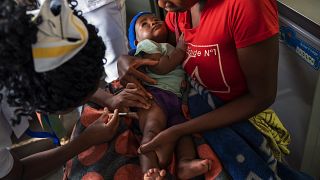
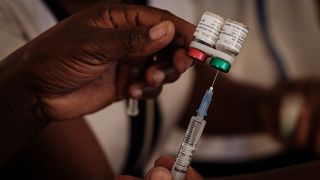
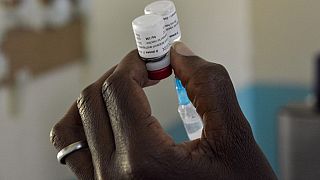
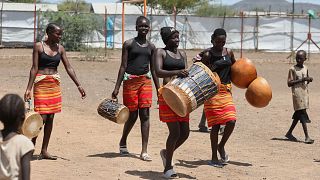
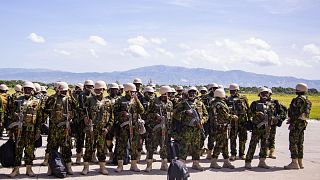




00:28
Nairobi hawker shot at close range by police declared brain dead
11:15
AI drones lead breakthrough against malaria in Africa [Business Africa]
01:29
Experts warn of danger of exercising in extreme heat and humidity
01:07
Kenya prepares for first anniversary of Finance Bill protests
01:52
UN's crucial humanitarian aid work faces a clouded future amid cuts in funds
02:00
Refugees in Kenyan camp face hunger after USAID funding freeze